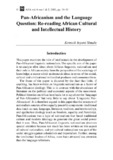Pan-Africanism and the Language Question: Re-reading African Cultural and Intellectual History
Abstract
This paper examines the role of intellectuals in the development of
Pan-Africanist linguistic nationalism. The specific aim of the paper
is to analyse elite ideas about African linguistic nationalism and
their role in African society from the perspective of the sociology of
knowledge, a stance which understands ideas in terms of the social,
cultural and civilisational milieu that produces and consumes them.
The focus of the paper is dictated by the fact that little, if
anything, has been written on linguistic nationalism as a factor of
Pan-Africanist ideology. This is in contrast with the abundance of
literature on the political and economic aspects of the movement.
Political theorists on Africa have had a lot to say about the ‘language
of Pan-Africanism’ but very little to say about ‘Linguistic PanAfricanism’. It is therefore argued in this paper that the structure of
nationalism consists of two equally powerful components: traditional
data (such as race, language, literature, tradition, and territoriality),
and egalitarian ideology (such as freedom, equality and fraternity).
Pan-Africanism was a type of nationalism that fused traditional
culture and modern ideology to generate the great social power
that it was. Thus, Pan-Africanist linguistic nationalism deserves
special attention because not much has been written on this aspect
of cultural nationalism, and yet cultural nationalism was part of the
social struggle against colonialism and imperialism. Further, among
the intellectual leaders of Africa, none have attracted less attention
than the language reformers.
URI
https://doi.org/10.4314/ajia.v6i1-2.57204https://www.ajol.info/index.php/ajia/article/view/57204
http://ir-library.mmust.ac.ke:8080/xmlui/handle/123456789/2476
Collections
- Gold Collection [1031]

